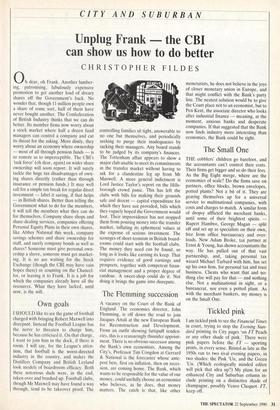Own goals
I SHOULD like to see the game of football charged with bringing Robert Maxwell into disrepute. Instead the Football League has the nerve to threaten to charge him, because he has criticised it. On that charge, I want to join him in the dock, if there is room. I will say, for the League's atten- tion, that football is the worst-directed industry in the country, and makes the Distillers Company and British Leyland look models of boardroom efficacy. Both these notorious duds were, in the end, taken over and brushed up. Football clubs, though Mr Maxwell may have found a way through, tend to be takeover proof. The
controlling families sit tight, answerable to no one but themselves, and periodically seeking to purge their inadequacies by sacking their managers. Any board stands to be judged by its company's finances. The Tottenham affair appears to show a major club unable to meet its commitments in the transfer market without having to ask for a clandestine leg up from Mr Maxwell. A more general indictment is Lord Justice Taylor's report on the Hills- borough crowd panic. This has left the clubs with bills for making their grounds safe and decent — capital expenditure for which they have not provided, bills which they vaguely hoped the Government would foot. Their improvidence has not stopped them from pouring money into the transfer market, inflating its ephemeral values at the expense of serious investment. The scourges of short-termism in British board- rooms could start with the football clubs. The money they need can be found, so long as it looks like earning its keep. That requires evidence of good earnings and prospects, together with competent finan- cial management and a proper degree of candour. A sweet-shop could do it. Not doing it brings the game into disrepute.


































































 Previous page
Previous page